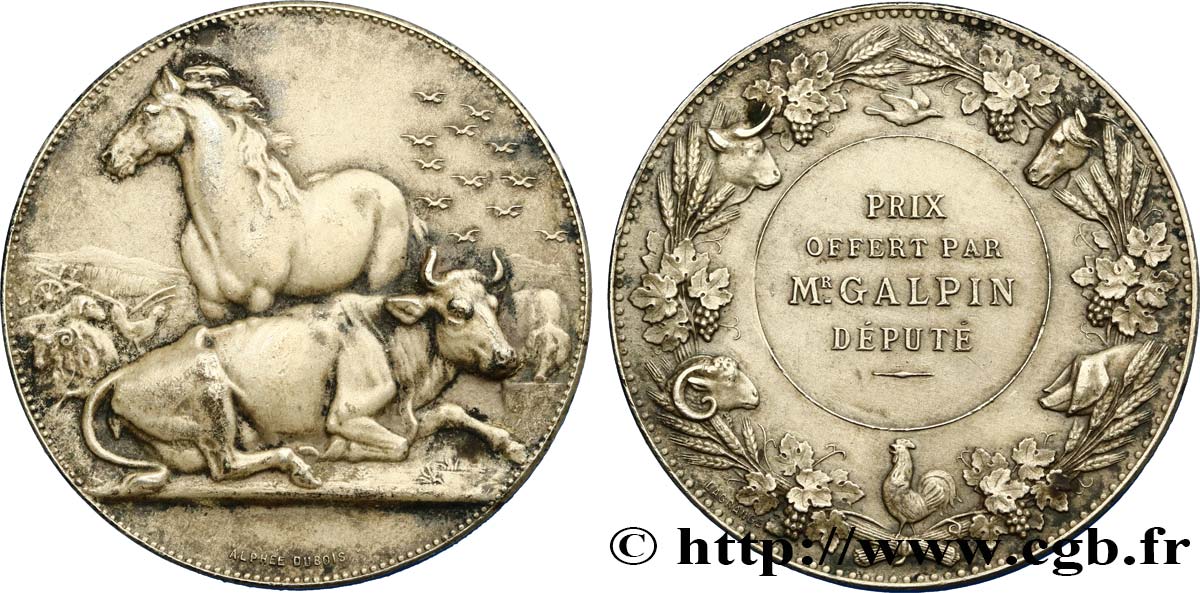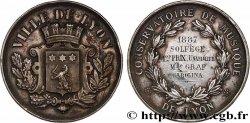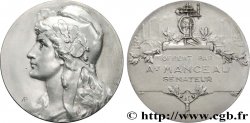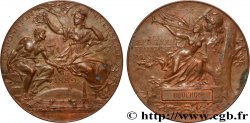fme_446757 - III REPUBLIC Médaille de la Société des agriculteurs de la Somme
Not available.
Item sold on our e-shop (2018)
Price : 75.00 €
Item sold on our e-shop (2018)
Price : 75.00 €
Type : Médaille de la Société des agriculteurs de la Somme
Date: n.d.
Mint name / Town : 72 - Le Mans
Metal : silver
Diameter : 36,45 mm
Orientation dies : 12 h.
Engraver DUBOIS Alphée (1831-1905) / LAGRANGE Jean (1831-1908)
Weight : 40,4 g.
Edge : lisse + Corne 1ARGENT
Coments on the condition:
Jolie médaille avec une patine grise et de petites zones plus sombres
Obverse
Obverse legend : ANÉPIGRAPHE.
Obverse description : Boeuf couché avec un cheval et un porc en arrière plan.
Reverse
Reverse legend : OFFERT/ PAR / MR GALPIN / DEPUTE.
Reverse description : Couronne de céréales avec tête de bélier, de boeuf, de cheval et de porc, avec un coq.
Commentary
Mr Galpin correspond à deux députés sarthois ;
- Gaston Galpin est un homme politique français né le 9 janvier 1841 à Alençon (Orne) et décédé le 21 mai 1923 à Alençon. Il se lance en politique dans la Sarthe, en devenant maire d'Assé-le-Boisne et conseiller général du canton de Fresnay-sur-Sarthe en 1877. Après deux échecs aux législatives de 1876 et de 1881, il est élu député en 1885 et le reste jusqu'à son décès en 1923. Il siège d'abord sur les bancs du groupe bonapartiste de l'Appel au peuple, puis comme non inscrit.
- Auguste Galpin est un homme politique français né le 23 février 1832 au Mans (Sarthe) et décédé le 15 décembre 1884 à Paris. Propriétaire terrien, il est un opposant libéral au Second Empire. Après le 4 septembre 1870, il est maire de Pontvallain et conseiller général du canton de Pontvallain en 1871. Il est député de la Sarthe de 1876 à 1884, siégeant au centre gauche et fait partie des 363 qui refusent la confiance au gouvernement de Broglie, le 16 mai 1877..
- Gaston Galpin est un homme politique français né le 9 janvier 1841 à Alençon (Orne) et décédé le 21 mai 1923 à Alençon. Il se lance en politique dans la Sarthe, en devenant maire d'Assé-le-Boisne et conseiller général du canton de Fresnay-sur-Sarthe en 1877. Après deux échecs aux législatives de 1876 et de 1881, il est élu député en 1885 et le reste jusqu'à son décès en 1923. Il siège d'abord sur les bancs du groupe bonapartiste de l'Appel au peuple, puis comme non inscrit.
- Auguste Galpin est un homme politique français né le 23 février 1832 au Mans (Sarthe) et décédé le 15 décembre 1884 à Paris. Propriétaire terrien, il est un opposant libéral au Second Empire. Après le 4 septembre 1870, il est maire de Pontvallain et conseiller général du canton de Pontvallain en 1871. Il est député de la Sarthe de 1876 à 1884, siégeant au centre gauche et fait partie des 363 qui refusent la confiance au gouvernement de Broglie, le 16 mai 1877..








 Report a mistake
Report a mistake Print the page
Print the page Share my selection
Share my selection Ask a question
Ask a question Consign / sell
Consign / sell
 Full data
Full data



